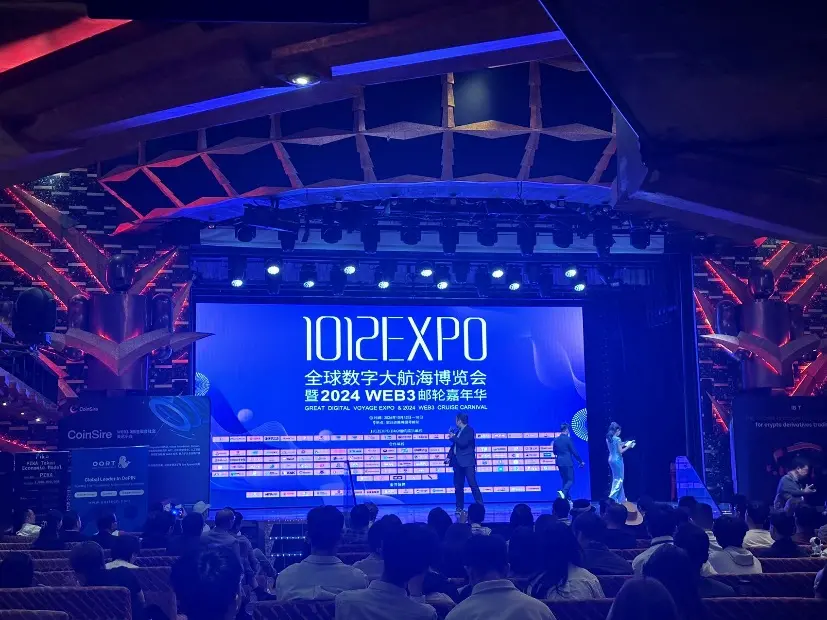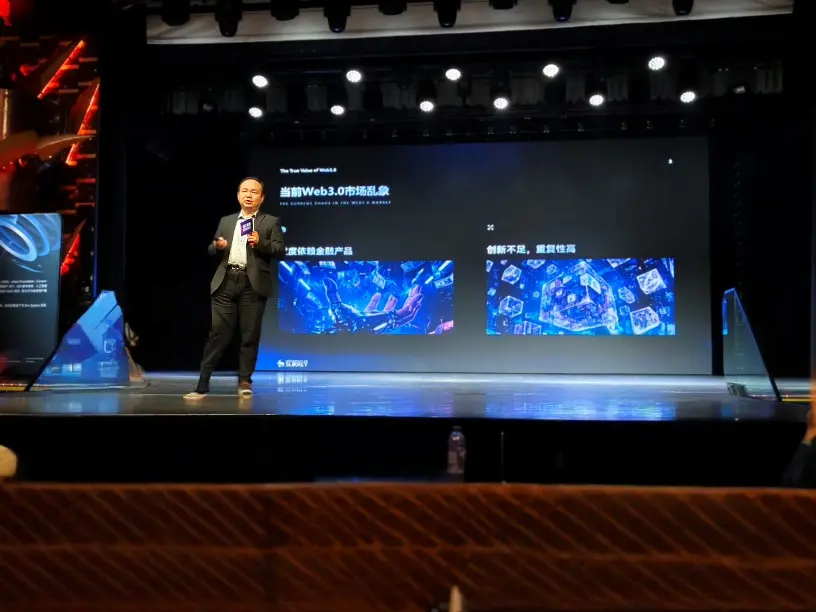October 13, 2024, Costa Smeralda Cruise

The Global Digital Maritime Expo and 2024 Web3 Cruise Carnival was grandly held on the Costa Smeralda cruise. Professor Xiong Yu, Associate Vice-Chancellor of the University of Surrey and Director of the Blockchain and Metaverse Applications Research Institute, delivered an important speech titled "Web 3.0 in the Age of AI Revolution: Redefining Innovation, Governance, and Human Empowerment," profoundly analyzing the current chaos in the Web 3.0 field. He pointed out that the emergence of artificial intelligence has not been well applied to the Web 3.0 ecosystem, but rather has exacerbated the chaos. To address this, Professor Xiong proposed a new vision for redefining Web 3.0.
In his speech, Professor Xiong noted that although Web 3.0 appears to be full of vitality, it has actually been simplified into a tool for financial speculation. Numerous projects utilize decentralized finance (DeFi) and non-fungible tokens (NFTs) to attract speculative capital, overly relying on hype to gain market attention. This has led to interactions between users and projects no longer being based on genuine value creation, but rather on the pursuit of short-term financial gains. Speculators profit from market fluctuations, while ordinary users often become victims. Users are not empowered to create mechanisms and do not receive the benefits they deserve. This vicious cycle deviates from the original intention of blockchain, undermines the potential value of Web 3.0, and even negatively impacts the industry, hindering development.
He further emphasized that in the future world, while artificial intelligence can accelerate user creation, it may also steal users' creativity. In this context, it is necessary to fully leverage the role of Web 3.0, enabling users to create more confidently and realize their own value.
Redefining the Development Direction of Web 3.0
In response to these issues, Professor Xiong proposed a redefinition of the development direction of Web 3.0. He emphasized that the core of Web 3.0 should be user-centered, building a decentralized ecosystem that empowers users, protects privacy, and ensures security. True Web 3.0 should grant users complete control over their own data, assets, and digital identities, preventing them from becoming tools for speculation. By promoting a co-creation economic model, users are encouraged to actively participate in the ecosystem, driving sustainable innovation and value creation.

Component-Based Development Mechanism and Zero Server Architecture
On this basis, the research team at the University of Surrey proposed a comprehensive framework and promoted a component-based development mechanism. Developers do not need to write excessive code or have in-depth knowledge of blockchain; they can develop Web 3.0 applications simply by combining some key components. The new protocol can adopt a zero server architecture, breaking through the limitations of traditional centralized technology, ensuring user autonomy and privacy protection. The protocol deploys artificial intelligence at various levels, allowing it to stay in sync with the latest technologies and functionalities at all times. On the protocol platform, artificial intelligence technology can be integrated to safeguard, supervise development, regulate direction, and improve functionality, allowing various technologies to merge and provide greater value to users.
Professor Xiong also mentioned that a key challenge currently facing Web 3.0 is the varying technical standards and development frameworks of different projects and platforms, leading to compatibility and interoperability issues. This technological fragmentation hinders collaboration and overall progress within the ecosystem, affecting the widespread application and popularization of decentralized technology. Through the new framework, developers can build interconnected applications across different platforms without worrying about compatibility issues. This not only significantly improves development efficiency but also promotes collaboration and innovation within the ecosystem. This mechanism and its concept have already been adopted by some development teams, including an upcoming market launch of the Endless Protocol.
Application Example: Luffa Instant Messaging Software
Under the framework of this protocol platform, users can develop applications without any programming background by assembling components, truly achieving "ready to use." Based on this protocol, several component-based applications have already been developed. For example, the fully decentralized and serverless instant messaging software Luffa has been launched on the Apple Store, available for users to download and use for free.
Industry Response and Future Outlook
Professor Xiong stated, "Our goal is to lower the entry barrier for Web 3.0, allowing more developers and users to participate. Through modular and component-based approaches, we hope to build a more open and inclusive decentralized ecosystem."
This speech attracted widespread attention and heated discussions among attendees. Industry experts believe that Professor Xiong's views provide new ideas for the current development of Web 3.0, and the innovations from the University of Surrey team are expected to bring positive changes to the industry.
The Global Digital Maritime Expo and 2024 Web3 Cruise Carnival, as an important communication platform in the industry, gathered numerous technology experts, industry leaders, and investment institutions. The successful holding of this conference will further promote cooperation and innovation in the Web 3.0 field, driving the healthy and orderly development of the industry.
免责声明:本文章仅代表作者个人观点,不代表本平台的立场和观点。本文章仅供信息分享,不构成对任何人的任何投资建议。用户与作者之间的任何争议,与本平台无关。如网页中刊载的文章或图片涉及侵权,请提供相关的权利证明和身份证明发送邮件到support@aicoin.com,本平台相关工作人员将会进行核查。




